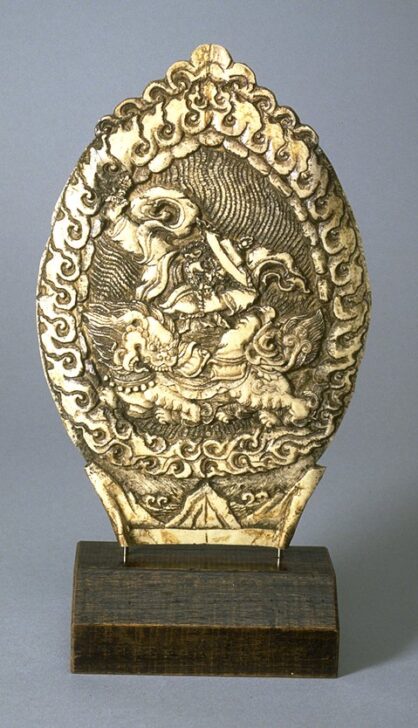Dorje Legpa Votive Plaque
Tibetan; Nepali

Description
March 28 2009
Dorje Legpa is an indigenous Tibetan deity believed to have been subjugated in the eighth century by the Indian Tantric Buddhist master Padmasambhava and bound by oath to act as a protector of Tibetan Buddhism. Dorje Legpa is worshiped as one of the highest ranking “oath-bound” guardian deities of the Nyingma tradition, which is one of the four main schools of Tibetan Buddhism. Dorje Legpa’s primary role is to safeguard texts called terma (hidden treasure) believed to have been buried by Padmasambhava and other teachers for future discovery at an auspicious time.
The deities depicted on both this plaque and the one to the left belong to the Nyingma tradition. Judging from their similar styles, these votive plaques were once part of a series depicting a particular Nyingma grouping of teachers and deities.
(Label for UMMA Buddhist Gallery Opening Rotation, March 2009)
Subject Matter:
An incised image of Pehar Gyalpo, a guardian of the Tibetan Buddhist faith; depicted as a male wearing a helmet and riding on a snow lion.
Pehar is one of a class of fierce deities known as dharmapala, or ‘defenders of the faith.’ His cult dates back to the late eighth century, when Guru Padma Sambhava, an Indian master of meditaion and tantric practices, ‘installed’ Pehar as the protector of Samye, the first Buddhist monastery in Tibet. He is also the deity channeled by the Nechung medium, who acts as the State Oracle of Tibet, and the chief dharmapala of Drepung Loseling Monastery.
Pehar is traditionally shown, as here, with a fierce expression, wearing a helmet, and astride a snow lion (an imaginary creature—which may in turn trample a corpse, although not in this example).
Physical Description:
A bas-relief carving made of underbelly of tortoise shell and in the shape of a lotus petal, depicting Pehar, a guardian of the Tibetan Buddhist faith, in wrathful form. At the base of the "petal" are the tops of mountains, with the waves of the sea visible between them; in the rounded part of the "petal," a border of flames encircles a dynamic image of Pehar, his garments flowing in the wind as he rides on a snow lion. The background behind Pehar is incised with closely spaced wavy lines, again suggesting flames.
Usage Rights:
If you are interested in using an image for a publication, please visit https://umma.umich.edu/request-image/ for more information and to fill out the online Image Rights and Reproductions Request Form.